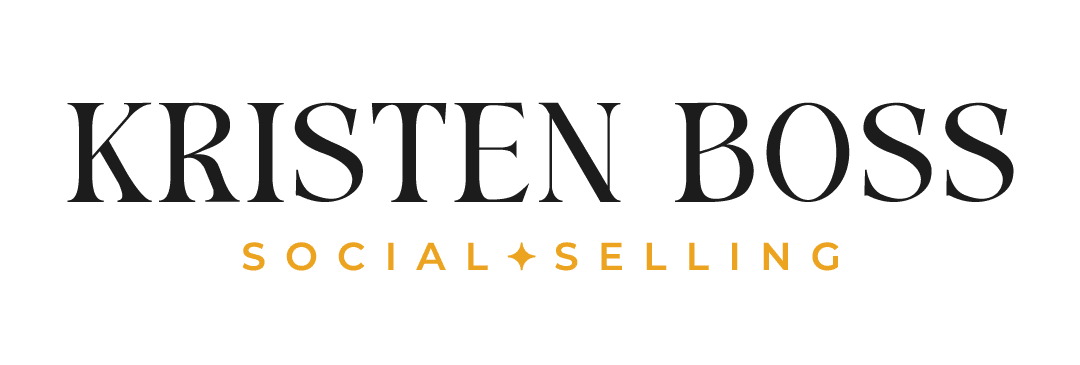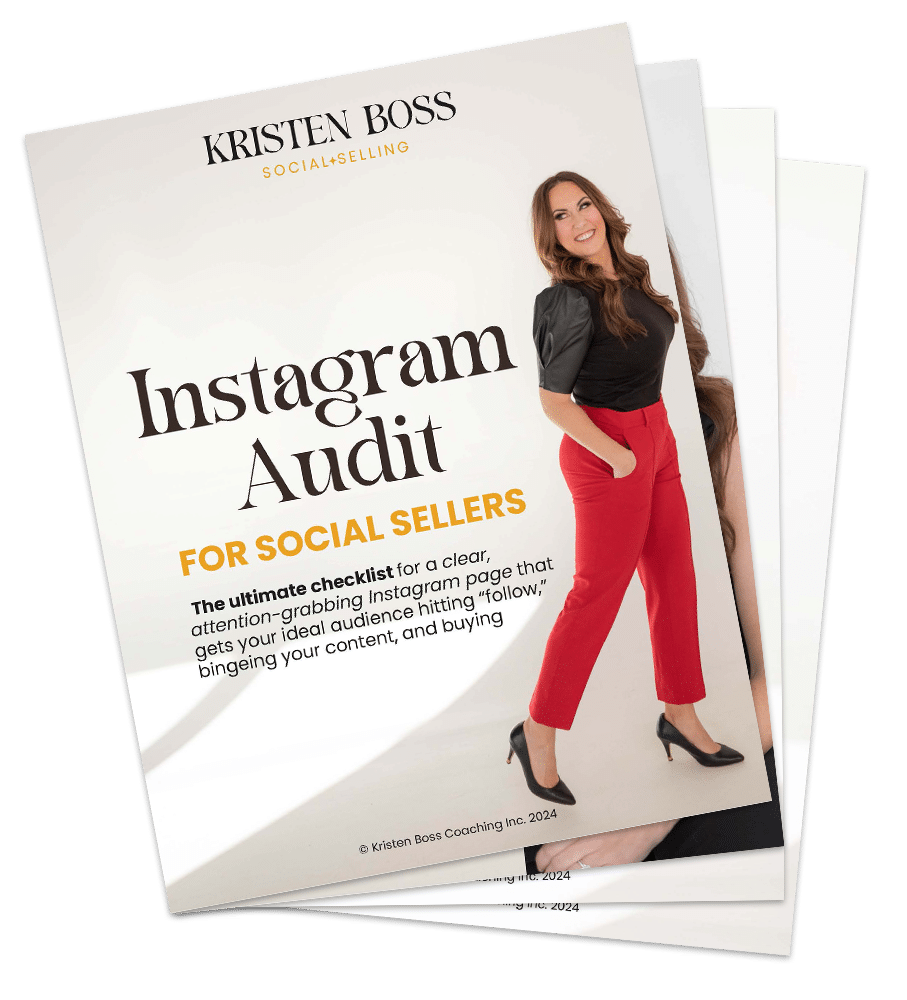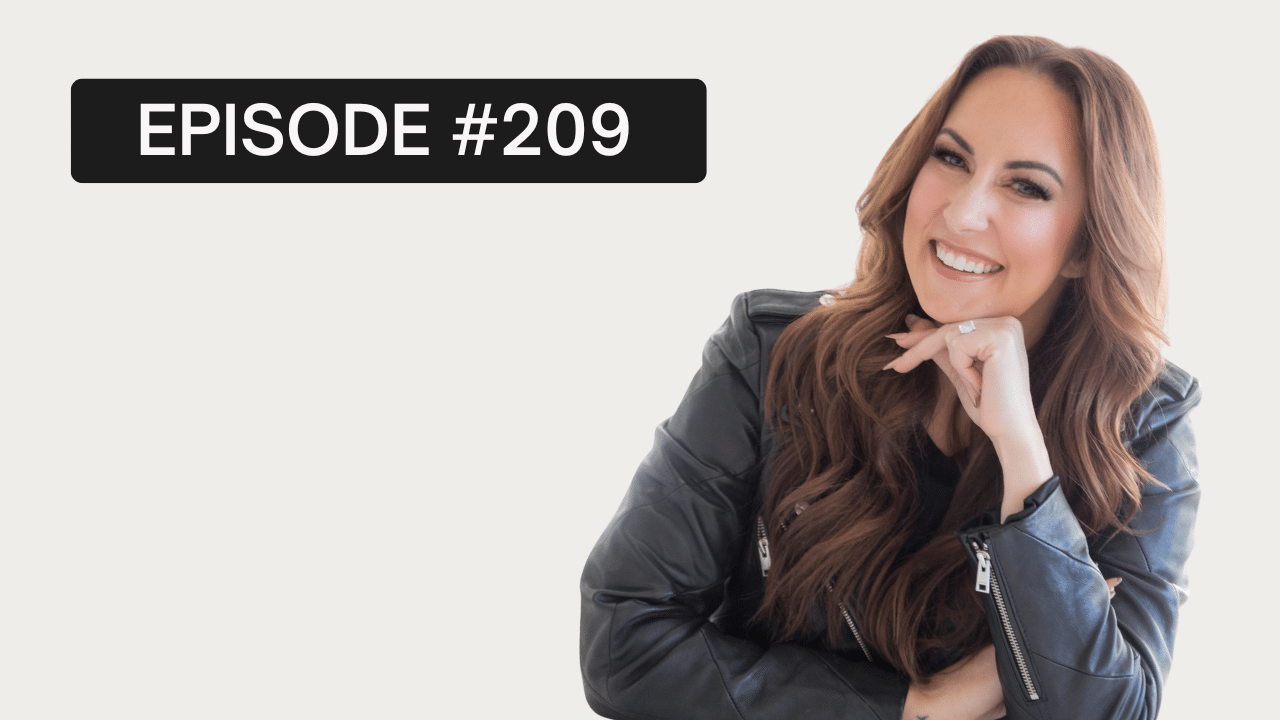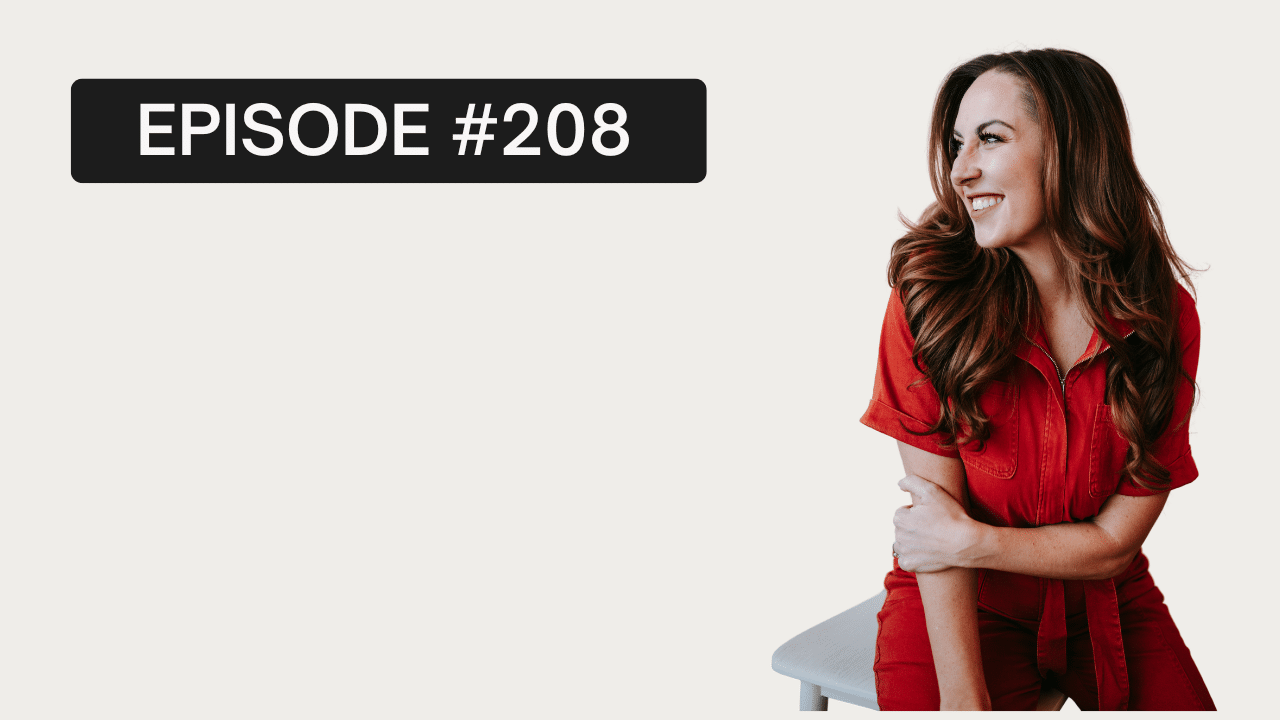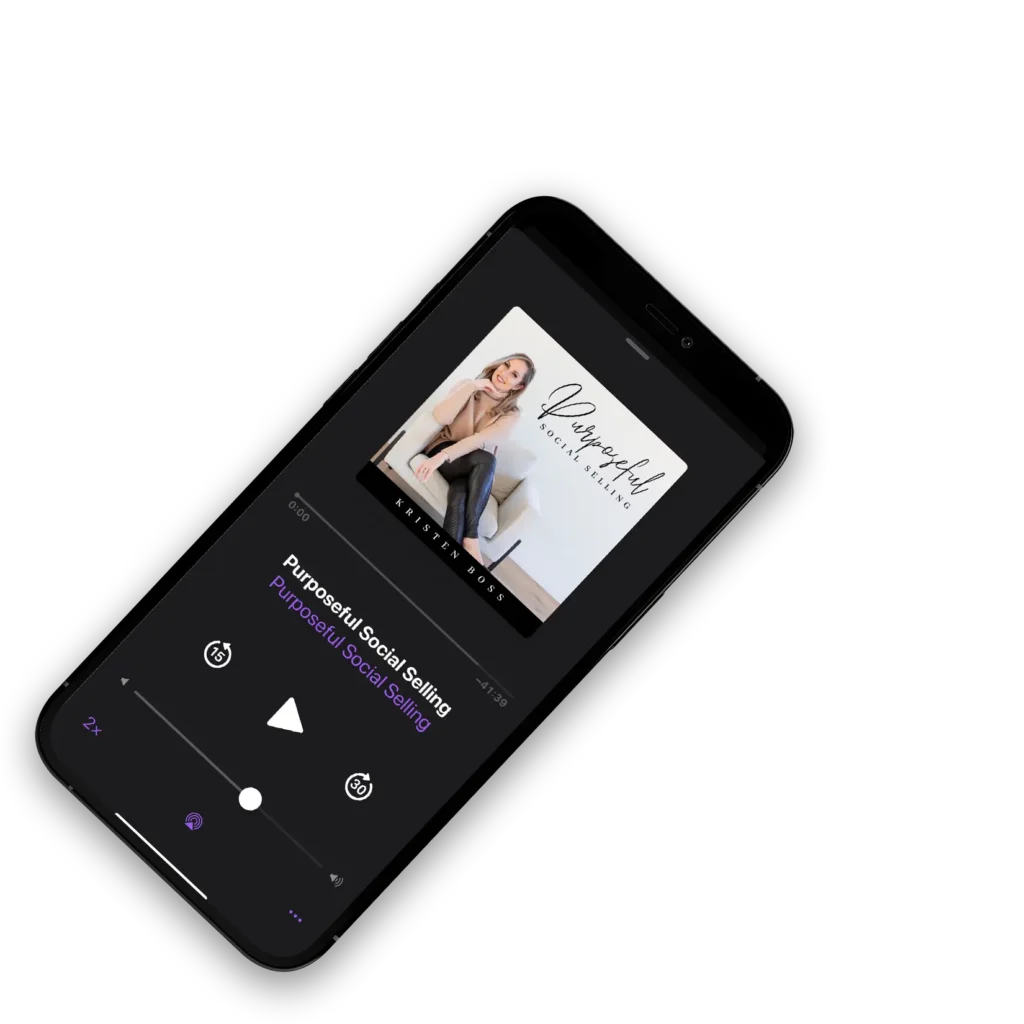From the moment you sign up to be an entrepreneur, a familiar companion settles in – the ever-present emotion of uncertainty. Kristen acknowledges this reality but emphasizes a crucial insight – it’s not just about the uncertainty itself; it’s about how you choose to show up in the face of it.
In today’s episode Kristen emphasizes a powerful truth – the more certain you are of yourself, the better equipped you are to handle the uncertainties that entrepreneurship inevitably brings. It’s a mindset shift that empowers entrepreneurs to face challenges head-on.
Here are a few highlights:
- She sheds light on the stark reality that only a small fraction of time is spent feeling like you’re “crushing it.” The journey involves signing up for both the good days and the bad days.
- Entrepreneurship is not always a safe space; it frequently involves discomfort. Kristen delves into the “freeze pattern” – the tendency to resist growth when leaving the safety of the familiar.
- Exposure to greater levels of doubt becomes a catalyst for expanding our capacity.
- When faced with uncertainty, Kristen advocates for the skill of “zooming out.” It’s a mental shift that prompts entrepreneurs to ask themselves, “Will this matter in a month? Two years? A week?
Kristen concludes with a powerful reminder – overcoming hard things grows your capacity. She urges entrepreneurs to embrace doubt, discomfort, and challenges as opportunities for growth. The journey is not just about surviving, it’s about continually expanding the capacity to achieve more.
I’m doing a FREE Social Selling Success in 2024 webinar TODAY, Monday 2/12.
At this webinar, I’m going to be sharing how the industry has changed THIS YEAR (yes, it’s always changing, and you need to stay up to date to maximize your success…)
Plus exactly what you SHOULD and SHOULDN’T be doing to grow.
And because I’m all about getting you into ACTION, I’m going to share checklists that will help you cut through the confusion, break up with analysis paralysis, and start implementing immediately.
Sign up now! Replays will be sent to all who register: https://kristenboss.com/social-selling-success-2024/
Thanks for listening! Do you have a question about network marketing? Kristen can help! Drop your question here, and she just might answer it live on the podcast: kristenboss.com/question
Transcript for Episode #201: Growing Your Capacity for More
Kristen Boss (00:19): You are listening to the Kristen Boss podcast. I’m your host, Kristen Boss. As a bestselling author and performance coach, I’m on a mission to share about sustainable and purposeful approaches to both business and life. Each week I bring relevant topics that I believe are necessary to create a life of purpose, significance and meaning. Entrepreneurship is about so much more than growing your bottom line. It’s about who you are becoming in the process and building a life that is truly extraordinary. Entrepreneurship is really just the beginning.
Kristen Boss (00:57): What’s up bosses? Welcome to another episode of the podcast, episode 2 0 1. What? I can’t believe I have a couple hundred episodes under my belt. I’m just going to pat myself on the back. That’s amazing. And what’s even more amazing is we have topped well over 3 million downloads. I think we’re coming up on 3.5, and that is a big thanks to you for sharing with your teams, your friends, your besties, all the times you listen in the car. I just want to say thank you so much, and if you haven’t already left a review, please do so. I read those reviews, I’m so thankful for them and they help the show get seen discovered and all that stuff. And by the end of the episode today, if you think this would serve a couple people, I want you to think of three people that you can send this to where it might serve them and help them in their business and with their goals for 2024.
Kristen Boss (01:44): You guys, speaking of 2024, I’m pumped about this year. I just have a good feeling, although it also feels like January 56th right now, and I still have my Christmas tree up. Guys don’t even judge me. And here’s why. Here’s I’m going to defend myself because I feel like I need to because usually I’m like, it’s down by January 5th at the latest, but we ski on the weekends and so we leave every weekend, and that’s usually when you would get the Christmas tree down. And it has been absolutely bonkers during the week and a lot of really exciting changes happening within my company that I’ll be sharing about that just has me so pumped for the future. And yeah, just with all that transition happening in the week, I’m like, now I don’t want to take down my Christmas tree. So just the other day, my daughter and I sat down and we made Valentine’s Day decorations and we made the cutest Valentine’s Day like Garland, and we’re probably going to put that on the tree.
Kristen Boss (02:41): So mom, if you’re listening, I’m sorry to disappoint you. I’m sorry. This is no reflection of how you raised your daughter. So I don’t know if anybody else has their Christmas tree, but I see you and there’s no judgment. We just love, it’s the advent advent. It’s the advent that’s happening a lot earlier for the rest of us. So anyways, I want to get to the topic at hand for today, and it’s a little skill I use when I tend to get caught up in the moment when something comes up in my business or something doesn’t go to plan. And I guarantee you have this happen on a semi-regular basis if not every day because when you sign up to be an entrepreneurship, what you’re actually signing up for is the ever present emotion of uncertainty. Is that going to work out? I don’t know.
Kristen Boss (03:26): Are people going to buy it? I don’t know. Is this post going to go viral? I don’t know. Am I going to hit my goals this year? I don’t know. We’ve just learned to, I think entrepreneurship and your ability to be in it for the long game is directly based on your capacity for how much uncertainty you are willing to feel. Because I find when people want to seek certainty, those are my friends that fall into the pit of perfectionism because they think, well, if I get it perfect, then that’s going to give me some measure of certainty that it’s going to work out and it’s not going to fail. Friends, you can never outperform, outdo, outthink uncertainty in this business. You can mitigate, you can make informed decisions, you can look at your data to help you make informed decisions. But I have found that uncertainty is always at play.
Kristen Boss (04:19): But what I can be certain of is who I am and how I’m showing up in my business and the habits I’m putting into place and me doing the things I know I need to be doing. So I would say, where are you actually feeling uncertain? Are you uncertain with the outcomes? Okay, that’s part of being an entrepreneur. This is the game we play. But if I find the more certain you are of yourself, the better you can handle uncertainty. Think about that for a second. I wasn’t planning on going down that path today, but I just think the skill I’m going to teach you called zooming out. It’s what I’ve been doing is when uncertainty comes into play and I start to second guess myself, wonder, think, oh, is this all going to fall apart? And I just want you to know clearly you never outgrow this.
Kristen Boss (05:07): You just learn to handle the uncertainty at bigger scarier levels as you grow in your business. So there’s no arriving first. Let’s just debunk that myth and think like, oh, once I make my first six figures, I’ll stop feeling this way. No, you won’t. You’re just going to feel it at a different level. You’re just going to grow your capacity for bigger problems. Problems don’t go away. You just grow your capacity for the problems. And so I think that’s when people have a rude awakening. And you know what? Maybe I experienced that myself. I think I thought I would hit a certain milestone in my business and all of my problems would magically disappear, and I’d never have to feel fear or uncertainty or doubt or struggle with my belief ever again. I think I thought, oh, if I could just get there, I’ll never have to feel this again.
Kristen Boss (05:51): And man, what a wake up call that was because that’s when I realized, oh, I’m always going to be a human having a human experience, having human emotions. And part of the human experience is experiencing things like fear, doubt, insecurity, joy, relief, disappointment, excitement, sadness, like one of our gifts in this world. That is our ability to feel the whole spectrum of human emotion. But we tend to want to avoid half of that spectrum and think those emotions don’t serve me. Sadness, disappointment, despair, failure. But I think we can only feel the good emotions when the negative ones give us contrast. I don’t think I would know the heights of joy unless I also understand the depths of longing or sadness and disappointment. And I think that’s what makes entrepreneurship really, really sweet is when you finally overcome something that has been so damn hard that has had you wanting to throw in the towel every other week and you finally accomplish it.
Kristen Boss (06:49): I feel like that sense of accomplishment is so much sweeter because you have dealt with setbacks and disappointments and failures and heartache and all of those things, but you don’t get to sign up for entrepreneurship and say, I only want to experience the good feelings here, the happiness, the joy, the excitement, the enthusiasm, the motivation. I’m like, oh no, you got to sign up for the full spectrum. As an entrepreneur, you have to sign up for the good days and the bad days, you actually have to sign up knowing that 80% of the time it’s going to feel mundane, monotonous, like you’re in the grind, nothing is happening. And the other 20% is like you feel like you’re actually making progress. And in that 20%, there’s only 2% where you feel like you’re actually crushing it and you feel like you’re on top of the world 2% of the time.
Kristen Boss (07:36): Hear me? 2% of the time you feel like you’re on top of the world. The other 98% of the time, you just feel like an ordinary everyday human. And I don’t care what the size of your bank account is, and I know that for a fact because I’m around people that have absolutely, it just feels like their pockets are bottomless and they still have the human experience and they still have days of doubt, uncertainty, fear, failure, all those things. So you can’t, and I think I used to really believe if I just worked myself and my book is a part of this, if you haven’t picked up the book Pivot to Purpose, I would encourage you to pick it up on Amazon. I talk about this, but I think what I was really trying to do all those years of working so hard, I just thought if I could just get to the finish line, I could just stop feeling these feelings.
Kristen Boss (08:21): And then I realized that the finish line, there was just feelings were always going to be there, and I had to grow in that and realize, all right, so why was I running from myself? Why was I running from those parts of the human experience and living in this world and all the lessons that are available to me through my failures and through the things that are hard? And so bringing it back to what I want to teach you today is oftentimes there’s going to be a moment where something feels really big and really huge and you’ll think, is this worth it? Start questioning your choices. Start wondering, should I just quit? Should I just walk away? Should I just, maybe it was more simple when I wasn’t aiming for such extraordinary things. Simple. Maybe I would say I think it felt emotionally safer when we’re not trying so dang hard to reach for such huge things because when we’re living in our comfort zone, we’re just never experiencing risk.
Kristen Boss (09:20): Not really. We’re not putting ourselves out there for somebody to potentially have a negative opinion of us. We can really engineer our lives to be quite comfortable where we’re only interacting with people that we know like us, that we know approve of everything we do. We’re interacting with people that agree with all of our lifestyle choices, and we can choose to not go out and meet new people that might challenge our worldviews. We can choose to alter our lifestyle in a way where we could just stay here. I’ve figured out my spending and my saving ratio, and I’ve figured this out and I got this. We can engineer safety in our life. And I think this is why entrepreneurship is so painful is because you are choosing to leave your engineered environment of safety and security, and you’re entering into a world that doesn’t feel emotionally safe all the time.
Kristen Boss (10:16): And it feels risky and it feels hard, and you’re putting yourself in the way of discomfort on purpose. And everything in our nervous system when we’re doing that and our body is literally crying for us to return to normal, kind of like a thermostat, it’s like, oh my gosh, it’s too hot in here. We have got to kick on the AC and bring the temperature back down because I don’t know how to operate at this level. And I think that’s when we do self-sabotage patterns where we find ourselves in fight, flight and freeze states. In our business, by the way we do this, guys, your nervous system has constant responses in your business. And this is why I love teaching neuroscience alongside business, because we think that that’s just for therapy and relationships and interpersonal dynamics. But man, your nervous system really is a key player when it comes to running a business.
Kristen Boss (11:04): And this is something I teach in depth inside the social selling leadership schools. First, how to regulate your own nervous system. And if you’re a parent, you know this work, you know that you are learning to regulate yourself while you are helping this little person who has no regulation skills in their body to do that for themselves. And as leaders, we learn to do that as well. How can I regulate myself as a leader to be self-aware so that I can care for myself? And then how can I recognize when somebody in my business, somebody who I’m leading is in a dysregulated state, they’re in their fight flight or freeze in their business, and how can I help them educate them to regulate or co-regulate being their leader so I can get them back into productive action in their life instead of staying chronically in a freeze pattern?
Kristen Boss (11:53): And you might be like, well, what’s a freeze pattern in my business? And a freeze pattern in your business would be like, that’s where you’re scrolling. Maybe you’re online shopping, maybe you are reading, watching tv, numbing out with food. You’re in a perpetual freeze state. Your flight state could be like you’re busying yourself with other things. That’s where you’re doing laundry, you’re doing chores, you are cleaning your office space, you’re being productive in anything but your business. And that’s like a form of it’s you’re running from the thing that is causing you fear, which would be making a post online or doing something that exposes your visibility and vulnerability in the online space. And you have this nervous system that’s like, oh wait, hold on. If we make a post about this, our tribe, our people, our sense of belonging is at risk. And if our sense of belonging is at risk, by the way, your primal brain interprets this as well, if I am ostracized from my tribe, from my people, I will die because we can’t do life alone.
Kristen Boss (13:02): That’s how it feels to be emotionally ostracized from circles that don’t accept you anymore or don’t get what you’re doing. That’s why it feels so incredibly painful to change, to grow, to pursue different things because we realize that what’s really at risk here is our sense of belonging to others and realizing, alright, I’m still going to change and then I’m going to have to find a new circle to belong to a new tribe, speaking of just from a primal state, a new group, a new community to belong to. But that in between the transition of leaving one community and the season of loneliness until you find the next community is a very real thing. And most people aren’t brave enough to soldier that temporary season of isolation until you can find the community where you belong again. And I would say we could look at that isolation and think that’s the worst thing to ever happen, and this is horrible. Or maybe that’s the season where you actually learn to belong to yourself first. You learn what you value, you learn what’s important. You learn to stand up for yourself, you learn to applaud for yourself, and nobody else is applauding. You learn to have a voice, you learn that you matter and you belong to yourself. And that Brene Brown has a saying.
Kristen Boss (14:25): The opposite of fitting in is belonging. And if you’re trying to fit in, usually you’re not belonging to yourself. So all that to say is these mechanisms we have in business when we feel at risk, when we don’t feel safe, when we’ve left our safety of our engineered environment, where we feel emotionally safe, we don’t have a of triggers that might trigger a emotional or nervous system response. So we engineer cozy environments and there’s nothing wrong with that because that’s survivalist at its core, but as an entrepreneur, that won’t work for you because as an entrepreneur, you have to constantly put yourself in the way of risk and grow your capacity to feel unsafe and learning to regulate yourself when your brain is telling you this is not safe. So when that is happening, when you’re spiraling or freaking out and you’re looking at your day and this is terrible or this business, I encourage you to zoom out, zoom out by a week, like, take today, zoom out a week from now.
Kristen Boss (15:40): Will it still matter? Zoom out a month from now. Will it still matter? Zoom out one year from now. Will this time in this moment, will it still matter? Zoom out five years from now, will it still matter? I find zooming out gives us healthy perspective on what we’re actually dealing with and realizing, okay, my brain is making a big freaking deal out of this right now, but if I were to zoom out, I would realize that this literally, I won’t even think about this moment two years from now. I won’t even think about this moment one month from now. Am I actually going to think about this one week from now? No. So why lose sleep over that perspective often helps give a different angle on perceived problems. And I find when problems feel very big, it’s because we lack perspective and we haven’t zoomed out enough.
Kristen Boss (16:33): It’s like we’re looking at the problem through a microscope and then we’re like, oh my gosh, this is so big. But then if we were to step away, it’s actually quite small, tiny, quite insignificant. So in those moments, I find zooming out is the best exercise, and I’m going to say this too for my perfectionists that are looking at their habits, looking at their business, and they’re thinking like, oh, I suck today. I didn’t show up. I forgot to make a post. I didn’t talk to my customers. I haven’t followed up in forever. Oh shoot, I haven’t mentioned my business in a month. Okay, you can sit there and beat yourself up, but you can be like, alright, well let’s zoom out. What were my habits over the week as a whole instead of just today? Alright, well, if I look at my week, I was actually really consistent and here’s the things I executed and did well, here’s the things I didn’t, okay, what do I want to learn from this?
Kristen Boss (17:27): What do I want to do different? The perfectionist is like, well, I’m an abysmal failure. Well start over again next week. Whereas somebody who is compassionate and is zooming out, they’re like, all right, well, if I was to zoom out six months ago, the person I was then wouldn’t have had a week like this. She would’ve crumpled and folded, hid behind Netflix and a bag of Cheetos because she just couldn’t handle. But did I do that this time? Oh, no, I still showed up. I did the thing. I still made posts. Albeit, was it perfect? No, but oh dang, I made some progress. I find that zooming out, not just with our future, but with our past being like, okay, how I’m judging myself for how I’m showing up today. Let’s just zoom out again. Am I showing up better than I did six months ago?
Kristen Boss (18:17): Yeah. Oh, that’s something I can feel really proud of. Am I zooming out? Am I showing up better than I did yesterday or a month ago? Okay, I could be proud of that. So what’s actually happening here is I’m having a bad day, and oftentimes a bad day can be reset with a nap, a good night’s sleep, some food and maybe a shower. We underestimate this guys. I really think our moms were onto something when they’re like, you know what? You’ll feel better when you’ve had some food, a good night’s sleep in a shower. For me, if I am feeling particularly just discouraged or not great about life, I can take a shower and just feel like I have a completely new lens. And again, again, it’s regulating my nervous system. It’s sensory. It’s like, okay, it gets me out of my fight flight response.
Kristen Boss (19:04): And sometimes that’s what we need to do. If you need to zoom out, sometimes what’s actually happening is you might need to ask yourself, what does my body need right now? Am I in a fight flight, a fight flight, freeze state, a fawning state? What’s going on and how can I provide safety to my body right now so we can help my brain and my body understand that there’s no actual threat to my safety right now so that I can chill out and gain perspective? Because I would say if you are in a dysregulated place in your body, meaning like you feel intense anxiety or you feel stressed or panicked or anxious or hangry or depressed or whatever it is, oftentimes in that moment we don’t have the capacity to zoom out because that requires a logic part of your brain where when you’re in that fight flight, you’re in your monkey state, you’re in your like, I just got to survive.
Kristen Boss (19:57): And at that point, you might need to hug yourself, do some breath work, take a shower, rest, maybe do some aroma therapy. There’s so many things you can do in that moment to help shift you out of the fight flight response and get back into your parasympathetic nervous system so that when you’re there, you can actually zoom out and gain perspective and realize, okay, the bigger picture here is I’m okay. The bigger picture here is I showed up better today than I did yesterday. The bigger picture here is I’m an entrepreneur and I’m a business owner, and what I just experienced was a certain measure of uncertainty that my nervous system went haywire over. And what I learned in that moment was how to calm and self-soothe myself so that every time I learned to do that, what I actually just did is through, you can call it exposure.
Kristen Boss (20:54): I just grew my capacity for hard things by a little bit more just now. Oh, I learned to calm myself down. I learned to gain some new perspective. I didn’t react. I didn’t freak out. I didn’t send 10 texts to my spouse or my bestie saying how everything in my life was falling apart. I actually self-regulated. I self soothed. Holy crap. This is progress. Because what I just did was I taught myself that I can in fact handle the feeling of uncertainty or the feeling of anxiousness or the feeling of doubt. And if I want to grow as an entrepreneur, it means I have to continue to expose myself to greater levels of uncertainty and fear and doubt and all those things. And in order for me to feel safe doing so, I actually have to partner with my body and my brain to expand my capacity and my ability to handle that.
Kristen Boss (21:45): Some people, I was saying this the other day, some people, they want to make six, seven figures overnight. And I might be like, you might not have the nervous system capacity to handle that without completely having a meltdown or a team of a thousand people that shows up overnight without having a massive meltdown. You actually have to grow your capacity to hold things. Like, I can give you 10 giant bags of sand and I’m going to say, Hey, I’m going to give you 10 bags of sand, and you might be sitting there with a little bucket and all that sand can’t fit in that little bucket. So we actually have to have a container that can hold 10 bags of sand. And so I would say every time you experience something hard in your business and you overcome it, what you just did was you grew your container to hold more, and then you overcome the next challenge and the container grows again, and you overcame the next challenge, and the container grew again.
Kristen Boss (22:45): And then eventually one day you get to a place where you do have a 10 gallon bucket or a massive bucket that can hold 10 bags of sand. And you realize, wow. And I will tell you it’s painful every time the bucket increases, it’s due to hard or painful circumstances because the things that change us are often painful. Just like with weight training, you can’t grow a muscle unless you put strain and resistance on it. You can’t grow a muscle unless you tear it. You have to tear a muscle and then it has to repair in order for it to get stronger. And then you do it again. You tear the muscle again, it repairs itself, it gets bigger. And building those muscles is a process of tiny little tears that your body works to repair and it handles more. And the more muscle builds and grows, the more weight it can handle, the more resistance it can handle.
Kristen Boss (23:39): So see yourself, maybe the buckets of sand wasn’t for you, but see like, alright, I just did a hundred pound deadlift the equivalent of a hundred pound deadlift in my business. Awesome. I now have the capacity to do a hundred pound deadlift, and eventually I’m going to grow into doing 135 pounds, 200 pound deadlifts, but I can’t just walk in the gym one day when I haven’t weight trained ever in my life and expect to do a 200 pound deadlift out of sheer willpower without real injury to myself. So this was your lesson in neuroscience today in partnering with your nervous system. But this is something I think is so important for us to have that perspective. And so I just want to encourage you to be compassionate, compassionate with yourself and zoom out and ask yourself, was I better yesterday? Did I do better today than I did yesterday?
Kristen Boss (24:29): Did I learn some lessons that grows my capacity? Did I just increase the size of my container because I overcame something that was hard? Awesome. Because the more I grow my container, the more I will be able to hold with success with the people I lead with the size of my audience. Listen, if you emotionally can’t handle a thousand followers, why do you think you’d be able to handle a hundred thousand or a million? Right? It’s just like we learned to grow our capacity. We learned grow with those things. And so while we can sit there and whine and complain that it’s taking too long, you could also look at this. How is this time a gift to me so that I can grow into the person that can handle this without having a meltdown, without it taking everything, taking its toll on my nervous system and my family and my mental health and those things.
Kristen Boss (25:21): Have you ever thought about that? That time is actually a gift to you instead of a liability or a sign that you suck or a sign that you’re taking too long, instead of it’s just taking me a little longer to grow my capacity. And that’s okay, but at least I’m in the process of growing my capacity at least. And I will say, the faster you, if you’re like, well, how can I increase my capacity or the size of the container as fast as possible? I’d be like, the more risk you’re willing to take, the scarier the situations you’re willing to put yourself in. For example, for me, and then we’ll wrap this up, but for me, it was like the first $20,000 I made in this business. I didn’t go and I immediately took that money. And most people, maybe from a place of scarcity would be like, I’m going to go pay all my bills with that now.
Kristen Boss (26:02): But for me, I’m like, I’m not here to just make 20,000. I’m here to make 200. I’m here to make 2 million. I’m here to do, I’m here to have a lot of impact. So I’m like, well, I’m going to take that 20. I’m going to invest it right back in and I’m going to enroll. I’m going to get mentors. I’m going to be in masterminds. I’m going to get in rooms. And I brought it back down to zero and trusting myself like, Hey. And in that moment, I was testing my capacity. I was testing. I was testing my investment capacity and testing my vision like, okay, if you really believe in your $2 million vision or your multimillion dollar company vision, then what is a $20,000 investment? Well, it’s nothing in the lens of that. So there we go. And I went down to now my net profit is zero, but I’m like, I know where I’m going.
Kristen Boss (26:45): And things blew up overnight. No, it wasn’t overnight. It was years, years of pain. But I will say from that investment, then I turned that 20 K into 200 K, and then I turned around and invest half of that. Then I turned that into that. I kept playing this, not a game with myself, but I kept stretching my container. I kept stretching my capacity, and every time I stretched my capacity, every time I left my comfort zone, I was growing my container. And the further I was able to venture from my comfort zone is how big I was able to upsize my container, if that makes sense. So friends, share this episode with a friend that would love it, leave a review. And also, today we have the Social Science Success 2024 free webinar. Join us. It’s happening right now. We’ll see you there, and if you want the replay for it, you just going to make sure you register. But I’m talking about all of the 20, 24 trends that you don’t want to miss so that you don’t feel like you’re behind and you know exactly what you need to be doing on your social media in order to have maximum impact this year in your business. We’ll catch you in the next episode.
Kristen Boss (27:59): That’s a wrap for today’s episode. Listen, if you love what you heard here today, I would love for you to leave a real quick rating and a review. This helps the show get discovered by new people. Be sure to take a screenshot of today’s episode and shout us out on Instagram. We’ll shout you right back out. If you’d like to find additional resources or discover how to work with me, head to kristenboss.com.
